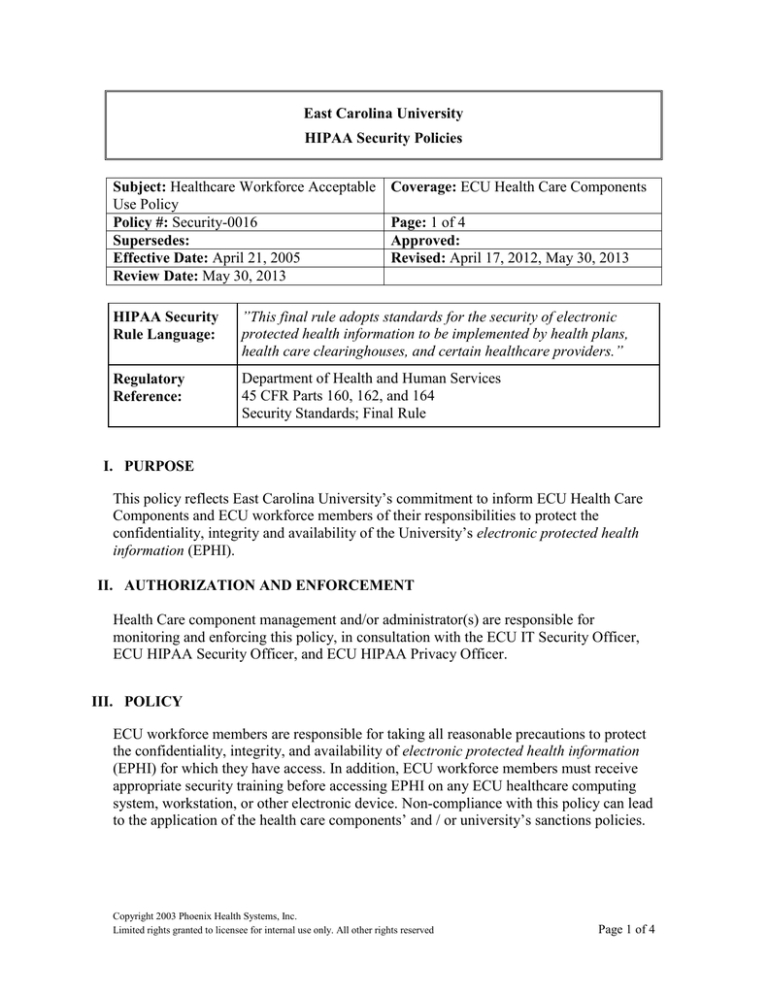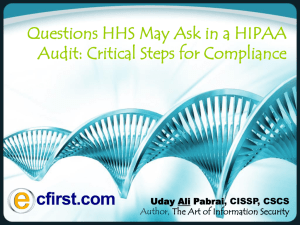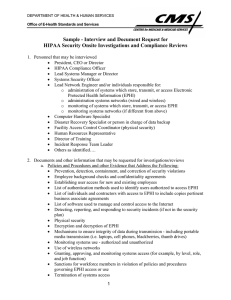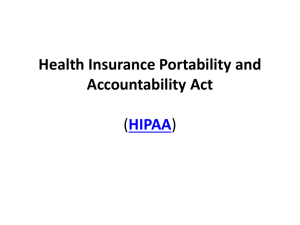
East Carolina University
HIPAA Security Policies
Subject: Healthcare Workforce Acceptable
Use Policy
Policy #: Security-0016
Supersedes:
Effective Date: April 21, 2005
Review Date: May 30, 2013
Coverage: ECU Health Care Components
Page: 1 of 4
Approved:
Revised: April 17, 2012, May 30, 2013
HIPAA Security
Rule Language:
”This final rule adopts standards for the security of electronic
protected health information to be implemented by health plans,
health care clearinghouses, and certain healthcare providers.”
Regulatory
Reference:
Department of Health and Human Services
45 CFR Parts 160, 162, and 164
Security Standards; Final Rule
I. PURPOSE
This policy reflects East Carolina University’s commitment to inform ECU Health Care
Components and ECU workforce members of their responsibilities to protect the
confidentiality, integrity and availability of the University’s electronic protected health
information (EPHI).
II. AUTHORIZATION AND ENFORCEMENT
Health Care component management and/or administrator(s) are responsible for
monitoring and enforcing this policy, in consultation with the ECU IT Security Officer,
ECU HIPAA Security Officer, and ECU HIPAA Privacy Officer.
III. POLICY
ECU workforce members are responsible for taking all reasonable precautions to protect
the confidentiality, integrity, and availability of electronic protected health information
(EPHI) for which they have access. In addition, ECU workforce members must receive
appropriate security training before accessing EPHI on any ECU healthcare computing
system, workstation, or other electronic device. Non-compliance with this policy can lead
to the application of the health care components’ and / or university’s sanctions policies.
Copyright 2003 Phoenix Health Systems, Inc.
Limited rights granted to licensee for internal use only. All other rights reserved
Page 1 of 4
HIPAA Security Policy # 0016: Healthcare Workforce Acceptable Use
IV. APPLICABILITY
This policy is applicable to all workforce members, departments, and health care
components that use or disclose electronic protected health information for any purposes.
This policy’s scope includes all protected health information in electronic form.
V. PROCEDURE
The following standards and safeguards must be implemented to satisfy the requirements
of this policy:
1. Your Role in Protecting EPHI: You are responsible for taking all reasonable
precautions to protect the confidentiality, integrity, and availability of electronic
protected health information (EPHI) for which you have access. At a minimum these
precautions require that you:
Must not share your account or your password: All activities associated with your
assigned user account are your responsibility
Must report any suspicious activity involving your account or other systems with
access to EPHI
Must not circumvent or otherwise bypass existing security measures: For
example, do not disable anti-virus or firewall software
2. HIPAA Security Training: You must receive training on HIPAA security issues before
accessing your computer accounts or ECU information systems containing EPHI. In
addition, you must attend training on an annual basis or more frequently as needed. Such
training will consist of, but is not limited to:
Responsibilities of workforce members for protecting EPHI
Security best practices (e.g. how to choose a good password, how to report a
security incident).
ECU information security policies and standards
3. Protecting Your Workstation: You must protect your workstation and the EPHI for
which you have access from unauthorized access. Workstations are defined in this policy
as desktop computers, laptops, personal digital assistants (PDA), and other electronic
devices that you may use to access EPHI. At a minimum, you:
Must not open email attachments without verifying with the sender
Must not download or install any software not required for official job duties
Must ensure anti-virus software is installed and regularly updated
Must ensure that your workstation is physically located in a manner that
minimizes the risk that unauthorized individuals can gain access: In addition, be
sure that your monitor or display screen is positioned to prevent viewing by
unauthorized individuals
Must log off from your workstation when your shift is complete.
Must ensure that your workstation is locked when unattended: This may be done
manually or by automated screen locking software
Page 2 of 4
Copyright 2003 Phoenix Health Systems, Inc.
Limited rights granted to licensee for internal use only. All other rights reserved
HIPAA Security Policy # 0016: Healthcare Workforce Acceptable Use
Must store all media (e.g., diskettes, zip disks, and flash drives) that contain EPHI
in a secure location: When disposing of media with EPHI, the data must be
removed with data sanitizing software or the media must be physically destroyed
4. Storing EPHI on your workstation: If possible, do not store EPHI on your
workstation. Use other alternatives, such as storing the EPHI on a secure server or a
secure network storage device. However, if you store EPHI on your workstation, the
following requirements apply to you:
You must obtain approval from your department head prior to storing EPHI on
your workstation.
o Your departmental management must inventory and document the EPHI
stored on your workstation at least on an annual basis.
o Your departmental management must review and document the security
safeguards for protecting the EPHI stored on your workstation.
You must encrypt the data files containing EPHI wherever possible
o If encryption is not possible, you must obtain a review by the HIPAA
Security and Privacy Officer prior to storage.
If you are storing EPHI on a portable device, such as a laptop or PDA, you must
encrypt the data to protect it from unauthorized disclosure in the event that the
device is lost or stolen. Refer to the HIPAA Portable Device Security Policy #
0017 for additional information.
5. Email and EPHI: Do not send EPHI over email unless you take reasonable
precautions to protect the EPHI. At a minimum you must (a) you send the email from
your ECU email account on the university’s enterprise email system to another ECU
email account on the university’s enterprise email system and implemented the
appropriate privacy controls or (b) you send email from your ECU email account to
locations outside of the enterprise email system, implemented the appropriate privacy
controls and encrypted the email with an ITCS recommended encryption solution. Refer
to HIPAA Privacy Policies, or contact the HIPAA Privacy Officer if you have questions
concerning privacy requirements. Refer to the IT Security Data Encryption web page or
contact ITCS @ 328-9866 if you have questions concerning email encryption. NOTE:
Vidant Health is considered outside of the university enterprise email system.
6. Wireless Networking and EPHI: Do not access or send EPHI over a wireless network,
unless the data is encrypted prior to transmission. Logging into the secure ECU
Buccaneer wireless network while on campus will provide the required encryption. Two
possible encryption alternatives for on campus or remote connectivity include the
university’s Citrix system for access to Centricity EMR and the university’s Virtual
Private Network (VPN). Data sent over a unencrypted wireless network can be captured
by unauthorized persons in nearby buildings, parking lots, and streets.
7. Non-compliance with this policy can lead to the application of the health care
components’ and / or university’s sanctions policies.
Page 3 of 4
Copyright 2003 Phoenix Health Systems, Inc.
Limited rights granted to licensee for internal use only. All other rights reserved
HIPAA Security Policy # 0016: Healthcare Workforce Acceptable Use
VI. COORDINATING INSTRUCTIONS
1. All section policies, standards and procedures will be reviewed annually. Every
section policy, standard and procedure revision/replacement will be maintained for a
minimum of six years from the date of its creation or when it was last in effect,
whichever is later. Other East Carolina University, University of North Carolina
system, or state of North Carolina requirements may stipulate a longer retention
period.
Page 4 of 4
Copyright 2003 Phoenix Health Systems, Inc.
Limited rights granted to licensee for internal use only. All other rights reserved





